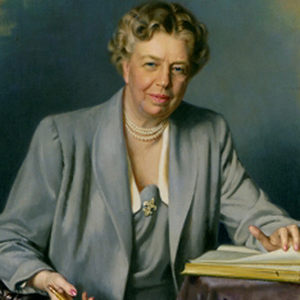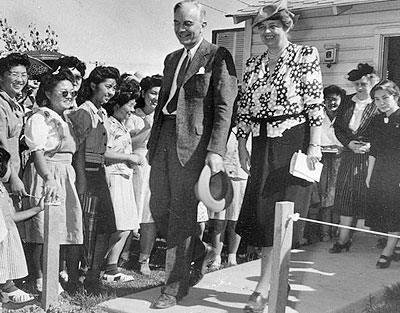Activist First Lady

The White House
In 1943 Eleanor Roosevelt visited the internment camp at Gila River and immediately started campaigning to assist confined Japanese Americans. In her syndicated daily newspaper column, she lauded the efforts of the inmates to grow their own food, ameliorate the harsh desert climate and the ugliness of the hastily constructed camps, and police and educate themselves. In an interview published in the Los Angeles Times three days after her visit, she was more frank in her comments. She described the inmates as living in conditions that were not indecent, but "certainly not luxurious," and added, "I wouldn't like to live that way." She strongly recommended that the camps be closed as soon as possible. "[T]he sooner we get the young [native-born] Japanese out of the camps the better. Otherwise if we don't look out we will create another Indian problem." It was her most open public expression of opposition during the war.
Her Speech

U.S. National Archives and Records Administration
I can well understand the bitterness of people who have lost loved ones at the hands of the Japanese military authorities, and we know that the totalitarian philosophy, whether it is in Nazi Germany or Fascist Italy or in Japan, is one of cruelty and brutality. It is not hard to understand why people living here in hourly anxiety for those they love have difficulty in viewing this problem objectively, but for the honor of our country the rest of us must do so. These understandable feelings are aggravated by the old time economic fear on the West Coast and the unreasoning racial feeling which certain people, through ignorance, have always had wherever they came in contact with people who are different from themselves. This is one reason why many people believe that we should have directed our original immigration more intelligently. We needed people to develop our country, but we should never have allowed any groups to settle as groups where they created a little German or Japanese or Scandinavian island and did not melt into our general community pattern. Some of the South American countries have learned from our mistakes and are now planning to scatter their needed immigration.
To undo a mistake is always harder than not to create one originally but we seldom have the foresight. Therefore we have no choice but to try to correct our past mistakes and I hope that the recommendations of the staff of the War Relocation Authority, who have come to know individually most of the Japanese Americans in these various camps, will be accepted. Little by little as they are checked, Japanese Americans are being allowed on request to leave the camps and start independent and productive lives again. Whether you are a taxpayer in California or in Maine, it is to your advantage, if you find one or two Japanese American families settled in your neighborhood, to try to regard them as individuals and not to condemn them before they are given a fair chance to prove themselves in the community.
"A Japanese is always a Japanese" is an easily accepted phrase and it has taken hold quite naturally on the West Coast because of fear, but it leads nowhere and solves nothing. A Japanese American may be no more Japanese than a German-American is German, or an Italian-American is Italian, or of any other national background. All of these people, including the Japanese Americans, have men who are fighting today for the preservation of the democratic way of life and the ideas around which our nation was built.
We have no common race in this country, but we have an ideal to which all of us are loyal: we cannot progress if we look down upon any group of people amongst us because of race or religion. Every citizen in this country has a right to our basic freedoms, to justice and to equality of opportunity. We retain the right to lead our individual lives as we please, but we can only do so if we grant to others the freedoms that we wish for ourselves.
Introduction from Greg Robinson, Université du Québec À Montréal
Speech from: Confinement and Ethnicity: An Overview of World War II Japanese American Relocation Sites by J. Burton, M. Farrell, F. Lord, and R. Lord
Last updated: June 29, 2018
